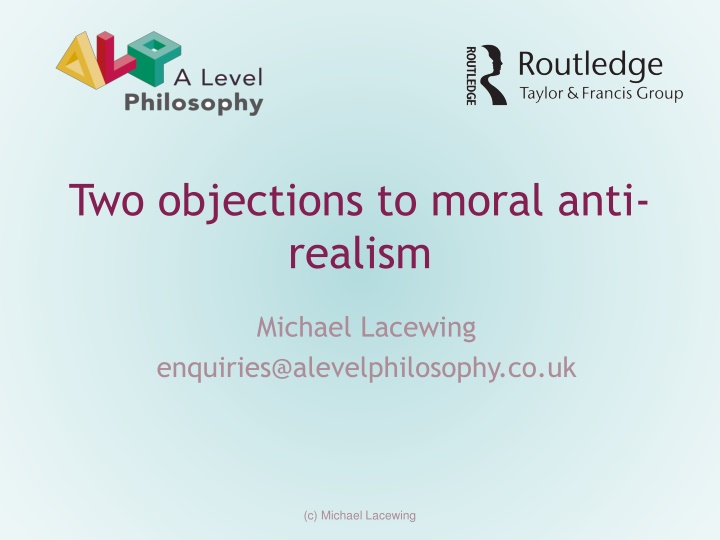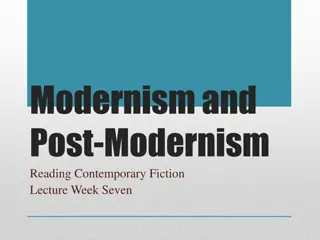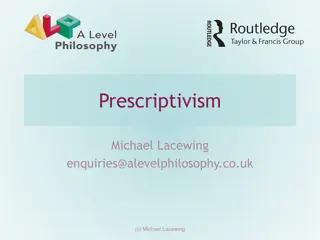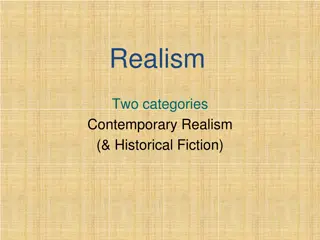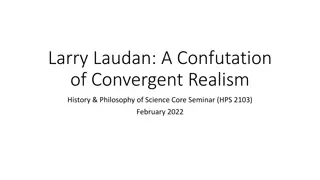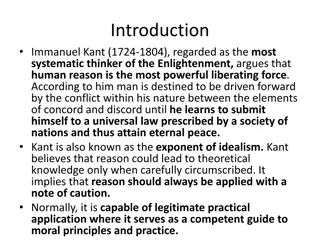Challenges to Moral Anti-Realism: Objections and Responses
The article explores objections to moral anti-realism, including moral nihilism, condemning immorality, and the notion of moral progress in the absence of moral reality. It addresses concerns about the justification for interfering with others' behavior, the relationship between moral beliefs and objective truths, and the possibility of moral progress despite the lack of moral objectivity. Various arguments and counterarguments are presented to shed light on these complex ethical debates.
Download Presentation

Please find below an Image/Link to download the presentation.
The content on the website is provided AS IS for your information and personal use only. It may not be sold, licensed, or shared on other websites without obtaining consent from the author.If you encounter any issues during the download, it is possible that the publisher has removed the file from their server.
You are allowed to download the files provided on this website for personal or commercial use, subject to the condition that they are used lawfully. All files are the property of their respective owners.
The content on the website is provided AS IS for your information and personal use only. It may not be sold, licensed, or shared on other websites without obtaining consent from the author.
E N D
Presentation Transcript
Two objections to moral anti- realism Michael Lacewing enquiries@alevelphilosophy.co.uk (c) Michael Lacewing
Metaethics What is morality, philosophical speaking? Can ethical claims be objectively true or false? Are moral properties part of reality? Moral realism: Moral properties are part of reality Independent of what we think is right/wrong Moral anti-realism: There are no such moral properties Error theory: moral judgments make claims about such objective properties, but fail to be true Non-cognitivism: moral judgments don t try to assert truths (c) Michael Lacewing
Moral nihilism Moral nihilism: there are no moral values or duties If, as moral anti-realism claims, there are no mind-independent moral properties, no objective moral truths, then isn t anti-realism just nihilism? If morality isn t objective, what obligation do we have to be moral? Reply: this is a misunderstanding Living as though there are no moral values is itself a kind of choice, an immoral one Non-cognitivism does not entail that we should stop having moral feelings! (c) Michael Lacewing
Condemning immorality But can we justify interfering with others behaviour because their actions interfere with our feelings? Reply: our feelings isn t the reason we interfere, the cruelty (or whatever) is But taking cruelty as a reason to interfere is itself subjective (c) Michael Lacewing
Moral progress If there is no moral reality, then our moral beliefs or feelings cannot become better or worse. They may have changed, but change is not progress if there is no truth. Reply 1: people s views can change for the better in non-moral ways, e.g. become more informed or rational (consistent or coherent) (c) Michael Lacewing
Moral progress Reply 2: people s views can become better in moral ways: If we disapprove of past moral codes and approve of our own moral code, then we will say that we have made moral progress. Moral progress is relative to a particular point of view but this is just the usual problem of moral disagreement (c) Michael Lacewing
